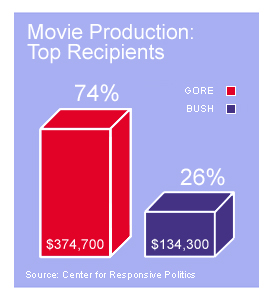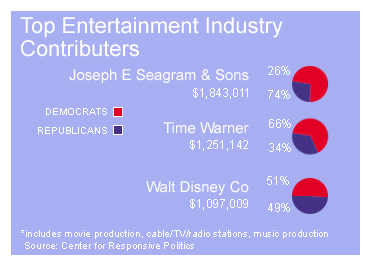|
Showbiz courts a critical Gore
|
 |
October 16, 2000: 7:04 a.m. ET
Al Gore gets Hollywood money, but industry seen thriving under either party
By Staff Writer Franklin Paul
|
NEW YORK (CNNfn) - Americans love TV and adore the movies, a truth not lost on presidential aspirants Al Gore and George W. Bush, who, despite recent fits of sound and fury signifying changes are in store, are likely to leave the entertainment industry to follow its own script.
The nation's next chief executive may eventually influence issues that affect show business, including foreign trade, copyright and free speech, anti-trust, and the regulation of the broadcast spectrum.
 Of course, what we see on television networks or in theaters remains a hot campaign issue, with each candidate pledging to keep violence and sex away from the eyes of America's youth. Of course, what we see on television networks or in theaters remains a hot campaign issue, with each candidate pledging to keep violence and sex away from the eyes of America's youth.
But experts say come 2001, it will be business-as-usual for the companies behind cultural icons such as Madonna, Mickey Mouse and Eminem. Neither candidate is seen doing more than waving an angry finger at "show-biz," which in years past has been left to regulate itself.
Click here for full CNN election coverage
"I imagine that after all the hype of the political season goes away, the industry would continue on its merry way," said University of Southern California Professor Eric Schockman, an entertainment industry expert. "There will be a lot of smoke and mirrors, but very little change on either side, whoever wins."
The politics of business: During the final month of the 2000 campaign, CNNfn.com will examine how key industries would fare under a Bush presidency or a Gore presidency. Each Monday and Thursday, CNNfn.com will turn its attention to a new sector. On Thursday, we will profile what each candidate would mean for the auto industry.
Schockman says that while the next president may grab headlines by attacking the industry's content or marketing schemes, legislative action is unlikely, lest the commander in chief be branded "Chief Censor."
"We are not going back to the 1950s, McCarthyism or the House Un-American Activities Committee," he said, referring to the Cold War-era congressional group that grilled executives from the major studios on alleged communist influence in the film industry. "Neither of these candidates will take us there."
Gore team blasts, but showbiz love$ them
Along with running mate Joe Lieberman, Vice President Al Gore has already shot up flares regarding Hollywood's depiction of violence. In September, Gore and Lieberman threatened government action within six months of their election if the industry fails to stop marketing R-rated films to children.
 It would be easy to dismiss these bully tactics as election season rants. But the Gore team has history here: in the 1980's, at the dawn of so-called 'gangster rap,' then-Senator Gore's wife Tipper Gore led a charge that sparked the music industry's adoption of a parental warning label system. It would be easy to dismiss these bully tactics as election season rants. But the Gore team has history here: in the 1980's, at the dawn of so-called 'gangster rap,' then-Senator Gore's wife Tipper Gore led a charge that sparked the music industry's adoption of a parental warning label system.
Moreover, during his congressional tenure, Lieberman has called for a "code of conduct" and better enforcement of media ratings, and has given out "Silver Sewer" awards to TV's worst cultural polluters. Previous award-winners include Fox (FOX: Research, Estimates), Seagram (VO: Research, Estimates) and CBS, which is now owned by Viacom (VIA: Research, Estimates).
All this potential fury comes from the ticket that bears the legacy of President Bill Clinton, who is considered to be a friend of Hollywood. Oddly perhaps, the industry also embraces Gore, that is, if campaign contributions are any gauge.
According to the Center for Responsive Politics' analysis of campaign contribution records to date, the entertainment industry has poured some $1 million into Gore's campaign war chest during the 2000 election cycle.
Of the half-million dollars contributed directly to either Bush or Gore by those in the movie production business, Gore has received 74 percent, to Bush's 26 percent.
Just days after Gore and Lieberman slapped Hollywood on the wrist, entertainers and moguls wrote checks at a Beverly Hills fund-raiser, which reportedly reaped over $4 million for the Democratic National Committee.
 "It's kind of ironic, because they come out here and collect all this money and yet they punish Hollywood," said Monty Warner, senior director of the Center for Study of Popular Culture, a conservative public affairs group based in Los Angeles. "It's kind of ironic, because they come out here and collect all this money and yet they punish Hollywood," said Monty Warner, senior director of the Center for Study of Popular Culture, a conservative public affairs group based in Los Angeles.
Warner notes that while Clinton was a master fund raiser in Tinseltown, his administration spearheaded several initiatives that criticized the industry, including the existing television rating system, which is meant to be used with the V-chip that allows parents to block out objectionable programming.
This month, Gore and Lieberman have tempered their argument by saying they are doing what's best for the country, as evidenced by Lieberman's recent comment at a Los Angeles fund-raiser.
Click here for a look at entertainment stocks.
"It's true from time to time we will be critics, but I promise you this: We will never, never put government in the position of telling you through laws what to make," Lieberman said, according to Reuters. "We will nudge you, but we will never become censors."
Monty Warner disputes that assertion.
"Despite what they have claimed, if it's to their advantage, they will launch an attack on Hollywood six months into their term," he said.
Bush represents unknown, but wallet fills anyway
To Hollywood, Texas Gov. George W. Bush represent an enigma, a wildcard some fear would mount a moral charge against an industry which has under Clinton's watch allowed off-color language and sexually-charged images to enter both "family hour" television and music CDs aimed at pre-teens.
 Perhaps Bush would not. Still, USC's Schockman says Hollywood, which is characterized as a very liberal town, may prefer to keep its allegiance with the party it knows best. Perhaps Bush would not. Still, USC's Schockman says Hollywood, which is characterized as a very liberal town, may prefer to keep its allegiance with the party it knows best.
"If I was a mogul talking to my studio executives, I'd be saying ... 'Al Gore and Lieberman can be tamed, whereas Bush and Cheney are still an unknown for the industry,'" he said. "(Democrats) have been cash cows for eight years and I don't see that changing. With the rallying around of the candidates, in both starlets and hard cash, I think that may be saying 'we could better deal with Gore and Lieberman.'"
For example, the improvement of trade relations with China, a key issue to the movie industry's long-term plans, was formalized under Clinton and Gore's watch.
Representatives for several media giants, including Time Warner, Seagram, and Disney declined to comment for this story. However, Disney and Time Warner, the parent of CNNfn.com, noted that their corporate political action committees, which funnel limited employee contributions based on their political preferences, have been strictly bi-partisan.
George W. Bush has for the most part remained mum on any specific plans for the entertainment industry, entering the debate only to champion family values and point out the "pervasiveness of violence" in films. Some election watchers suggest he has held his tongue because bashing Hollywood did not work in 1996 for Republican presidential candidate Bob Dole.
Or, others say, he may also be wary of challenges to his 10-year tenure as a paid director of Silver Screen Management Services, an investment firm that raised money for the production of several successful films with violent themes. Bush's team has said that his duties at the firm, which also financed G-rated Disney films like "The Little Mermaid," never included picking which films to bankroll.
Despite Bush's general reticence, show business contributors have not neglected him. According to the Center for Responsive Politics, he has received $740,000 from the industry. Of that, $270,000 came from entities representing TV and radio stations, more than three times the $81,000 they had given to Al Gore.
 Dudley Mendenhall, Bank of America Entertainment and Media managing director, suggests that entertainment companies may see advantages in a Bush presidency, such as a more relaxed regulatory environment for acquisition-hungry media conglomerates. Dudley Mendenhall, Bank of America Entertainment and Media managing director, suggests that entertainment companies may see advantages in a Bush presidency, such as a more relaxed regulatory environment for acquisition-hungry media conglomerates.
Any such softening might be a welcome change for leading companies like Viacom, Seagram and Time Warner (TWX: Research, Estimates), who each have endured intense scrutiny during their recent mergers and acquisitions.
"It won't be a day and night type contrast, but Bush might be a little more supportive to additional mergers, or to liberalizing cross-ownership between, say, print media and broadcasters, than a Gore administration might be," said Mendenhall.
Whoever wins the election is sure to remember that entertainment is a robust, global industry fueled by current and future voters, a system of willing repeat customers sure to balk should limits be placed on how they can enjoy themselves.
That's why genres such as horror films and heavy metal music have survived decades of grumbling from critics and lawmakers.
"In the end, people are still going to pay their eight dollars to go to the movie houses to be scared," said Schockman. "In the end they still want to be titillated by the visual or auditory realms that shock our senses."
Laird Anderson, American University professor emeritus of communication, concurred, adding that the next president will have his hands full with issues such as foreign policy, abortion and the economy.
"People are going to respond to what they see and hear in the way that they want to see it and hear it," he added. "I'm not too sure that the presidential candidates are going to have an effect on that." 
|
|
|
|
|
 |

|

